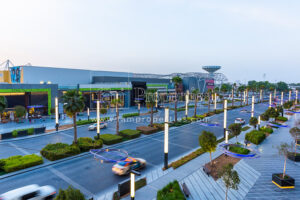Globalization is a term that has become increasingly prevalent in today’s interconnected world, representing the rapid integration and interdependence of countries across various aspects of life. It refers to the process through which goods, services, capital, information, and ideas flow seamlessly across national boundaries. The concept of globalization encompasses not only economic factors such as trade and investment but also cultural, social, and political dimensions. Over the past few decades, globalization has significantly transformed societies by facilitating greater intercultural exchanges, fostering technological advancements, and shaping global governance structures. However, it has also generated intense debates regarding its impact on employment patterns, income inequality, environmental sustainability, and national sovereignty. Defining globalization and its Significance
Historical background: Origins and evolution of globalization
Globalization, as a concept, has a long and complex history that dates back centuries. Its origins can be traced back to the ancient Silk Road, which connected civilizations across Asia, Europe, and Africa. This network of trade routes facilitated the exchange of goods, ideas, and cultures between different regions. However, it was during the Age of Exploration in the 15th century that globalization began to take shape on a larger scale.
European explorers like Christopher Columbus and Vasco da Gama opened up new trade routes around the world, leading to increased interactions between previously isolated societies. The establishment of colonial empires by European powers further accelerated globalization as they brought their languages, religions, and economic systems to different parts of the globe. The Industrial Revolution in the 18th century marked another significant milestone in globalization’s evolution.
With advancements in transportation and communication technologies such as steamships and telegraphs came increased global connectivity. Goods could now be transported faster than ever before while information could be transmitted across vast distances almost instantaneously. This era also witnessed a surge in international migration as people moved from rural areas to cities or crossed borders seeking better opportunities.
Overall, globalization has been shaped by historical events such as trade routes development during ancient times and European exploration during the Age of Discovery. It gained momentum with colonialism’s expansion throughout various regions worldwide and continued its trajectory with industrialization’s onset during the 18th century.
Economic impact: Global trade and interconnected markets
Globalization has led to the growth and proliferation of global trade, resulting in interconnected markets around the world. This economic interconnectedness has had a profound impact on both developed and developing nations. One of the key benefits of global trade is increased economic efficiency. Countries can specialize in producing goods or services that they have a comparative advantage in, thereby maximizing productivity and output. This specialization allows nations to access a wider variety of goods at lower prices, benefiting consumers globally.
Additionally, global trade has facilitated economic growth by providing opportunities for businesses to expand their markets beyond domestic boundaries. By accessing larger customer bases abroad, companies can increase their sales and profit margins. In turn, this stimulates investment and job creation within these firms, contributing to overall economic development.
However, it is essential to acknowledge that not all nations benefit equally from global trade. While some countries experience rapid growth and prosperity as a result of participating in international trade networks, others may face challenges such as increased competition or dependence on foreign markets for their products. Furthermore, globalization can also lead to income inequality within countries if the gains from trade are not distributed evenly among different segments of society.
In conclusion, global trade and interconnected markets have played a pivotal role in shaping today’s economies through increased efficiency, market expansion opportunities for businesses, and overall economic development. However, policymakers must address potential inequalities arising from globalization by implementing policies that ensure fair distribution of benefits among all members of society.
Cultural exchange: Diversity and homogenization in a globalized world
Globalization has undoubtedly led to an increase in cultural exchange across the globe. As people from different parts of the world come into contact with one another through travel, trade, and technology, they bring with them their unique customs, traditions, and beliefs. This has resulted in a rich tapestry of diversity as various cultures interact and influence one another.
However, alongside this celebration of diversity also comes the concern for homogenization. Some argue that globalization promotes a certain level of sameness as cultures adopt elements from one another to fit into the globalized world. For example, fast-food chains can be found in almost every corner of the planet, leading to a loss of traditional cuisines and local culinary practices. Similarly, fashion trends become standardized across continents as Western styles dominate global markets.
While cultural exchange fosters understanding and appreciation for different ways of life, it is essential to strike a balance between preserving cultural identity and embracing diversification. It is crucial that societies actively promote their distinct heritage while also being open to new ideas and influences from other cultures. By doing so, we can ensure that globalization does not lead to the erosion of cultural diversity but rather serves as a catalyst for cross-cultural enrichment on a global scale.
Political implications: Power dynamics and global governance
Globalization has brought about significant shifts in power dynamics and global governance, leading to various political implications. One of the key effects of globalization on power dynamics is the rise of multinational corporations (MNCs) and their influence on political decision-making. With their vast resources and global reach, MNCs often exert considerable pressure on governments to shape policies that align with their interests. This has raised concerns about the erosion of national sovereignty and democratic principles as MNCs increasingly wield power comparable to that of nation-states.
Furthermore, globalization has also led to a reconfiguration of global governance structures. Traditional institutions such as the United Nations (UN) and World Trade Organization (WTO) have faced challenges in effectively addressing issues related to economic inequality, climate change, and human rights violations due to their outdated frameworks. As a result, there has been an emergence of new forms of global governance involving regional organizations and informal networks that seek to address these pressing challenges more efficiently. However, this trend raises questions regarding accountability and inclusivity as these alternative arrangements may lack representation from all nations or may prioritize certain interests over others.
Overall, the political implications arising from power dynamics and global governance in the context of globalization are complex and multifaceted. It requires careful consideration and continuous efforts to strike a balance between ensuring fair representation for all stakeholders and addressing urgent global issues effectively.
Also Read: HOW TO WRITE A SUCCESSFUL BUSINESS PLAN IN 9 STEPS (2023)
Environmental Challenges: Effects on natural resources and Sustainability
Globalization has undoubtedly brought about numerous benefits, such as increased trade and economic growth. However, it has also contributed to a range of environmental challenges, which directly impact natural resources and sustainability. One of the primary concerns is the accelerated depletion of natural resources. As countries become more interconnected through trade, there is an ever-growing demand for raw materials, energy, and water. This puts immense pressure on ecosystems that are already struggling to sustain their resources at a natural equilibrium.
Moreover, globalization has led to the intensification of industrial activities across the globe. With multinational corporations seeking cheaper labor and less stringent environmental regulations in developing countries, there has been a significant increase in resource extraction and pollution generation. The extraction of minerals, fossil fuels, and timber often occurs without a thorough consideration of sustainable practices or ecological impacts. This not only depletes valuable natural resources but also results in habitat destruction and biodiversity loss.
Furthermore, globalized supply chains have enabled the transportation of goods over vast distances. While this facilitates international trade, it also leads to a substantial carbon footprint due to increased emissions from transportation activities. Additionally, the growing consumption patterns associated with globalization contribute to waste generation on an unprecedented scale. From disposable packaging to electronic waste from discarded gadgets – these products put further strain on limited natural resources while polluting landfills or being incinerated.
Conclusion: Assessing the benefits and drawbacks of globalization
In conclusion, globalization has brought numerous benefits to the world. Firstly, it has facilitated the exchange of goods and services across borders, leading to increased economic growth and prosperity. This is evident through the rise in international trade and foreign direct investment, which have enabled countries to tap into global markets and benefit from economies of scale. Additionally, globalization has also promoted cultural exchange and understanding among nations. The sharing of ideas, values, and traditions has fostered a sense of interconnectedness and tolerance among diverse societies.
However, despite its advantages, globalization also comes with some drawbacks. One major concern is the increasing income inequality within countries as well as between nations. While globalization can generate wealth for some individuals or regions, it can leave others behind due to job displacement or unfair competition from low-cost labor markets abroad. Furthermore, globalization has led to environmental degradation as industries strive for greater production efficiency at the expense of natural resources and ecosystems.
Overall, while acknowledging the benefits that come with globalization such as increased economic growth and cultural exchange, it is crucial to address its negative impacts on income inequality and environmental sustainability to ensure a more equitable and sustainable future for all.












